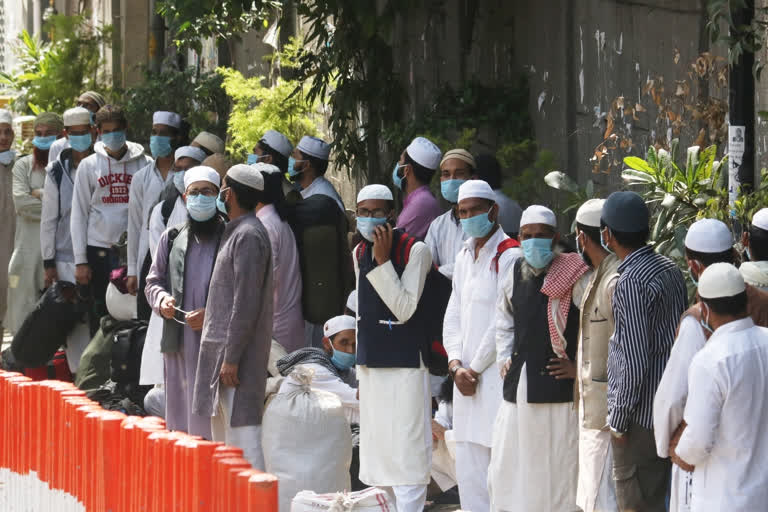New Delhi: At the time of writing this comment on Sunday (April 5), the total number of confirmed COVID-19 cases in India has crossed the 3500 mark and it is certain that this figure will soon go above 4000 as the insidious virus spreads.
What is cause for concern is that one estimate has traced as many as 30 per cent of the confirmed infections with the religious gathering held by the Tablighi Jamaat (TJ) in Delhi in March. Members who attended this annual religious congregation in Nizamuddin soon returned to different parts of the country and currently large parts of India have COVID-19 cases linked to the TJ meeting.
The states so affected in order of maximum cases include: Tamil Nadu, Delhi, Andhra Pradesh, Telangana, Uttar Pradesh, Rajasthan, Jammu and Kashmir, Assam, Karnataka, Andaman and Nicobar, Uttarakhand, Haryana, Maharashtra, Himachal Pradesh, Kerala, Arunachal Pradesh and Jharkhand. Health authorities fear that this number will see a spike given the reluctance of members of the TJ to report their symptoms and recent travel history, as also post-Nizamuddin social contact details.
Consequently, there has been anger and dismay in India, and biased television and social media reportage has led to a pattern of anti-Tablighi sentiment, which alas has also acquired an anti-Muslim orientation. In a deeply polarized socio-political milieu, the COVID-19 virus is now being perceived in India as having a religious DNA and the phonetic play between corona and korana is corrosive and undesirable. Misplaced conjecture streamed across social media (the primary eco-system for fake news and hate missives) and political discord has cast aspersions on the BJP and the RSS for stoking communal passions during a national health emergency.
Read: COVID-19 quarantine facilities: Need of the hour
Thus it was encouraging to note Union Health Minister JP Nadda urging his party leaders "to refrain from giving any 'communal colour' or create any 'division or differences' over the COVID-19 outbreak." At a meeting held in Delhi (April 4) senior BJP leaders were reported to have conveyed to the media that "There was already a direction that we have a great responsibility of leading the nation. The virus and the disease have made everyone vulnerable across the world, of all faiths ; no one should issue any statements or remarks that are provocative."
Specific to the various charges against the leadership of the TJ and the need not to make inflammatory remarks, a BJP party leader added: "This was reiterated when the Tablighi issue came up. There is a directive that no one should make it a communal issue. Only leaders of the minority community can comment on that if they wish to. We have to be united in our fight against the virus."
There is persuasive evidence to suggest that the leadership of the TJ had been in violation of the COVID-19 related directives in mid-March and whether this was a case of rank ineptitude, or misplaced faith-driven perfidy will need to be established through an objective and fact-based investigation. And this should not be delayed given the profile of the TJ and the perception-linkages in the collective psyche across the world in relation to puritanical Islam, jihad, terrorism et al.
Regrettably since the Nizamuddin incident and the linkage with the COVID-19 virus was first established, one cross section of the audio-visual media has gone rabid in its shrill reportage. Fake news has been splashed liberally and invalid linkages made between the more recent anti-CAA Shaheenbagh protests from another part of Delhi with the activities of the TJ in Nizamuddin.
Read: Muhammad Saad Kandhalvi is in Delhi, not absconding: Jamaat
This trend ought to have been nipped in the bud by a strict enforcement of the hate-speech directives that the government has invoked in other cases but this did not happen. Hence the Nadda intervention is doubly welcome and one hopes that the BJP cadres and the more faithful in social media will pay heed to the advisory to avoid provocative remarks in relation to the COVID-19 virus and religious sentiment.
Thus, it was gratifying to note that some states have issued firm directives against the attempt by media outlets and social media users to cause divisiveness in society when the country and its one billion plus citizens are grappling with the COVID-19 challenge.
In this context, the Chief Minister of Maharashtra Uddhav Thackeray is to be commended for his 'stern warning' in relation to the dissemination of fake videos. In a message released through the social media platform Facebook (April 4), he warned that violators would face penal action.
While confirming that 100 per cent of the Tablighi Jammat participants who had returned to Maharashtra had been identified and isolated, the CM noted: "Like Coronavirus there is another virus that is emerging which is threatening social harmony, the virus of fake news and communal hatred. We will save Maharashtra from this crisis. But, if someone circulates fake news or videos like commodities or notes being smeared with saliva or with inflammatory content, my law will catch up with them. They will not be spared. Don’t do this even for fun."
This is sage counsel and one hopes that it would encourage other states to do the same. India has to prepare for a gradual return to normal rhythms of social and economic activity after the 21-day national lockdown is reviewed in mid-April and any action that leads to divisiveness in India’s vast demography over the COVID-19 virus must be rejected.
Read: Over 300 Tablighi Jamaat members tested coronavirus positive in Pak's Punjab



